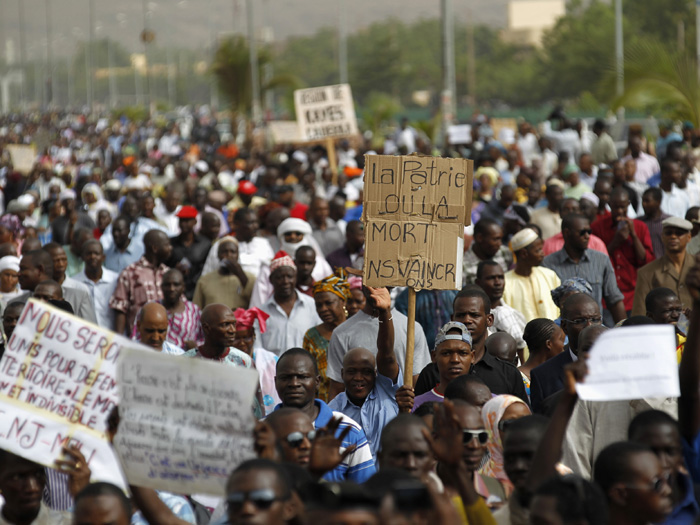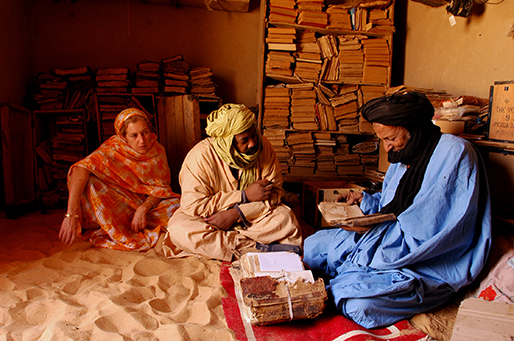 Republic of Mali is an ECOWAS member nation strategically positioned in a sub-Saharan zone of Africa. Mali shares common border with 7 nations Mauritania and Algeria in the North, Niger in the East, Burkina- Faso and Ivory-Coast in the south, Guinea in South West and Senegal in the west.
Republic of Mali is an ECOWAS member nation strategically positioned in a sub-Saharan zone of Africa. Mali shares common border with 7 nations Mauritania and Algeria in the North, Niger in the East, Burkina- Faso and Ivory-Coast in the south, Guinea in South West and Senegal in the west.
A nation with a population statistics of 15 million with a landscape of 1,241,238km². A nation with 94.5% Moslems, 2.4% Christians and 5.0% Animist. French is the official language. Though Mali is classed as an Islamic nation, the constitution establishes a secular state and provides for freedom of religion.
Two-thirds of Christians in Mali are Catholics while one-third belongs to protestant denomination. Catholics are the first sets of Christians known by Malians and this has really affected their general conceptions about Christianity. It is important to stress that the poverty level in the Malian society when Catholics came automatically provides a vast operational zones for the catholic missions. They heavily invested in the educational sectors by the construction of modern schools and vocational centres; they also provide scholarships for children from extremely poor family and they equally invested in the health sector by building health centres and hospitals.
 The interventions of the Catholics missions created a very powerful impression in the minds of Malians and this impression became a stumbling block after many years for the Protestants when they also came to work in Mali. Malians discovers Christianity on the humanitarian platform and all they know about Christianity is ‘’people that came to help us improve our standard of living ‘’ and not people that came with the good tidings of the Gospel of Christ. In fact, these mind-sets eventually created serious problems for Protestant / Evangelical denominations that came in with raw message of repentance and redemption. It was very difficult for Malians to migrate from their old adherence of goodie-goodie of Father Christmas kind of Christianity to the evangelical beliefs that illuminates the heart. They were very sluggish in the acceptance of the evangelicals simply because they came to preach an Invisible Jesus that sends visible men with ordinary tracks and Bibles whereas they use to know another denomination that builds schools and hospitals and also give them food to eat.
The interventions of the Catholics missions created a very powerful impression in the minds of Malians and this impression became a stumbling block after many years for the Protestants when they also came to work in Mali. Malians discovers Christianity on the humanitarian platform and all they know about Christianity is ‘’people that came to help us improve our standard of living ‘’ and not people that came with the good tidings of the Gospel of Christ. In fact, these mind-sets eventually created serious problems for Protestant / Evangelical denominations that came in with raw message of repentance and redemption. It was very difficult for Malians to migrate from their old adherence of goodie-goodie of Father Christmas kind of Christianity to the evangelical beliefs that illuminates the heart. They were very sluggish in the acceptance of the evangelicals simply because they came to preach an Invisible Jesus that sends visible men with ordinary tracks and Bibles whereas they use to know another denomination that builds schools and hospitals and also give them food to eat.
Over the years, the evangelicals started expanding their territories in a strategic manner. Though, it took a very long time to convince even the political deciders to accept and ascertain their authenticities and this give birth to a law that obliged evangelical churches to register their churches under the status of Non-profit organization and they cannot operate without a certificate of authorisation which can be retrieved at any time.
About 20 years ago, another set of Christian missions started moving into Mali and these missions are predominantly from Nigeria. These missions have the intention of winning Mali for Christ but the task was not as easy as they were thinking it will be simply because they never put into consideration the nature and the peculiarity of the terrain.
 Deeper life Bible church is one of the first missions, Redeem Christian church of God, and Baptist mission Assembly of God’s church, winner’s chapel and all the so-called mega churches in Nigeria are opening up branches.
Deeper life Bible church is one of the first missions, Redeem Christian church of God, and Baptist mission Assembly of God’s church, winner’s chapel and all the so-called mega churches in Nigeria are opening up branches.
Furthermore, it must be stressed that Malians saw the Gospel as a very big threat to their religion and this is the point where evangelicals started having problems. Even in the light of the most pacific evangelical strategy, they still see Christians as people who came to influence their lives in order to change their religion. As a result of this, they became very sensitive to Christian activities like crusade etc and they do everything possible to obstruct it because they believe that Christians are very good brain-washers.
Though, with the restriction Christian faced over the years, a lot of churches doubled their efforts in the evangelical programs like establishing branches in the villages and the remote areas. This is with the intention of bringing the Gospel to people in the grass-root. Though, the grass-root evangelism strategy yielded some fruits because the people in the villages are generally poor and the churches also adopts empowerment programs that help an average villager to have at least something to live on. These programs made a lot of Malian change their religion. Logically, we can say that they became Christians because they are victims of circumstances.
In order to come out of this problem of discrimination, churches in Mali also developed a strategy of training indigenous missionaries. This strategy opened up a platform on which trained Malian missionaries could easily evangelize their kinsmen in their own local dialect without fear and complex.
However, with the positioning of Mali as a nation, there are zones that are not friendly with Christians. The Northern part of Mali is not an evangelical favourable zone. Christians are warned not to preach or hold public programs because of the Islamic dominations of such zones. Though churches are in these zones, but it’s extremely difficult to penetrate them with the Gospel.

There are five major problems facing the advancement of Christianity in Mali and the surrounding nations
- LACK OF UNITY IN THE BODY OF CHRIST
It is very difficult for Christian churches to come together as one body with one goal. Catholics are known already as the pace setter but the moment protestant churches started springing up, they looked down on Catholics, sabotage and criticize their beliefs but it is unfortunate to also see that even among the protestants, division had set in. Churches are operating individually and it’s as if they are creating their own kingdoms.
- COMPOUNDED DOCTRINAL DIFFERENCES
Division among Christians in Mali is not limited to people, it digs deep into the doctrinal values of the church. The advents of some strange doctrines that churches claim to be Biblical are creating serious problem to the extent that some churches will prefer never to have anything to do with a particular church because of their doctrine.
- LACK OF FLEXIBILITY
Greater percentage of missionaries that worked or still working in Mali are seriously struggling with the problem of flexibility. They want things to be done in their own ways, they are not interested in their local language and culture and they are not ready to be patient with the Malians. Naturally, Malians are very slow, reserved and highly dogmatic people.
- ISLAMIC FUNDAMENTALISM
In the mind of Moslems, Christians are not practising the real religion and they are ready to do everything possible to refuse and make others refuse the Gospel. They are organizing series of awareness programs that will discourage their people listen to Christians. They are multiplying the construction of mosques in all the streets, giving free Islamic education to children, opening free centers where Arabic language is being taught free, building of relief centres for poor Muslims and they are even sending brilliants Muslim youths to nations like Saudi Arabia, Kuwait, Dubai, Pakistan, Iran and Iraq for studies.
- CULTURAL / TRADITIONAL ADHENRENCES
Cultural adherence is one of the major problems Christianity is facing in Mali and her environs. It is true that just 5% of Mali population are Animists but it is surprising to see that Mali Christians and Muslims still engages in the same animist acts. They cannot really present the light to the animists simply because they are also in the dark. This situation makes it practically impossible to push Christianity chariot forward in Mali.
- Cross Border Perspectives
 Senegal and Mali share the same realities, greater percentage of Muslims, very few Christians and animist. Christianity in Senegal is not popular the way it’s minutely popular in Mali. This is due to the fact that Senegalese has very strong attachment to two Islamic sects namely Tidjaniya Umariya and Muridiya. In fact, the lives of an average Senegalese revolve around these sects. In a nation where Islam is practised in a sectorial and tabooed manner, it’s obvious that Christianity may not have a smooth ride alongside with other religions especially when they are religiously influencing the government.
Senegal and Mali share the same realities, greater percentage of Muslims, very few Christians and animist. Christianity in Senegal is not popular the way it’s minutely popular in Mali. This is due to the fact that Senegalese has very strong attachment to two Islamic sects namely Tidjaniya Umariya and Muridiya. In fact, the lives of an average Senegalese revolve around these sects. In a nation where Islam is practised in a sectorial and tabooed manner, it’s obvious that Christianity may not have a smooth ride alongside with other religions especially when they are religiously influencing the government.
Mauritania and Niger are nations where there is little or no visibility for Christianity. In fact, the section 5 of their 1991constitution declares Islam as the religion of Mauritania and the people and this is the reason why the nation is officially recognized as an Islamic Republic. It’s almost impossible to see an original indigenous Christian Mauritanian. One could probably see a converted Mauritanian practising Christianity with lots of discretion just to guard against attacks and violent confrontations. Initially, it’s only Catholics that are permitted to build churches in Mauritania but today, Christian churches, especially the Pentecostals are now operating in Mauritania and Niger but under very dangerous and precarious situation.
Christianity in Burkina-Faso and Guinea is flourishing because of the influence of Christian nations around these 2 nations. Togo, Ghana and Ivory Coast are almost Christian nations and they really influence Burkina-Faso. Guinea was influenced by Sierra-Leone, Liberia and Ivory Coast while a fractional part of Burkina Faso and Guinea are not really opening their doors to Christianity but these nations as a whole are dancing greatly to the Tam-Tam of the Gospel.
.
Reports by our man in Mali,
Kolade Rotimi.









